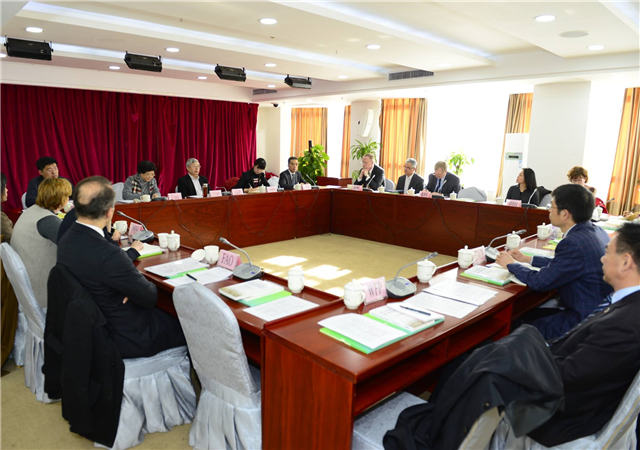Joint Efforts to Accelerate Global Poverty Alleviation
P.china.org.cn,March 04, 2018 Adjust font size:

Representatives from the State Council Leading Group Office of Poverty Alleviation and Development (LGOP) and heads of the China offices of major international organizations and international NGOs met in Beijing on Thursday to discuss how to promote joint efforts in poverty alleviation in China and globally.
The 2018 Dialogue with International Organizations on China’s Poverty Alleviation was hosted by Liu Yongfu, Minister of the LGOP, and attended by representatives from international organizations including the United Nations Development Programme (UNDP), the World Bank (WB), the Asian Development Bank (ADB), the UN Food and Agriculture Organization (FAO), UNICEF, and WHO. Representatives from the Bill & Melinda Gates Foundation, Heifer Hong Kong Limited and Mercy Corps also attended the discussions.
Minister Liu Yongfu briefed the representatives on China’s recent progress in poverty alleviation, as well as seeking advice and suggestions on the next steps for the country’s poverty alleviation work. While praising China’s success in economic development and achievements in reducing poverty and promoting sustainable development over the past 40 years, the representatives noted that complex challenges remain ahead as the year 2020 approaches, a key deadline by which the Chinese government has vowed to see no one left in extreme poverty in the country.
Nicholas Rosellini, UN resident coordinator and UNDP resident representative in China stressed the importance of sustainable balanced development. He noted that sustainable balanced development goes beyond lifting people out of income poverty and addresses a wider definition of poverty. He also pointed out that the most vulnerable groups in China have not fully benefited from the country’s economic success, therefore efforts should be made to ensure the wellbeing of those people.
Bert Hofman, World Bank Country Director for China, Mongolia and Korea said the key challenge for China in the next stage of poverty alleviation would be the shift from eradication to prevention. He expressed the belief that China’s targeted poverty reduction programs will continue to help, but that the major contribution must come from the modernization of fiscal, health, and pension systems.
Benedict Bingham, Country Director of ADB Resident Mission in China emphasized the need for the world to learn from China’s valuable experiences in poverty reduction over the past forty years, and especially from its specific policies and programs to fight rural and urban poverty and to provide access to social services. He also pointed out that the accountability mechanism and horizontal cooperation between and across central and local governments are best practices in poverty reduction.
Representatives also called for enhanced cooperation with the Chinese government to address issues such as child poverty, inequality, and rural poverty.
Rana Flowers, UNICEF Representative to China, encouraged more investment in early childhood and in human capital, which she believes is crucial for improving productivity and living standards. She proposed to work closely with the Chinese government to build the capacity to measure and track child poverty indicators.
Dr.Fabio Scano, WHO Officer-in-Charge in China, raised the issue of delivering health services at county level. He said 44 percent of rural poverty in China is caused by medical costs. He proposed to provide primary healthcare services to county level, restructuring the way healthcare services are delivered.
Dr.Vincent Martin, FAO representative in China, asserted that innovation and technology should play a key role in poverty alleviation. He added that international organizations can work with the Chinese government and the private sector and universities to utilize technology in future endeavors to address rural poverty.